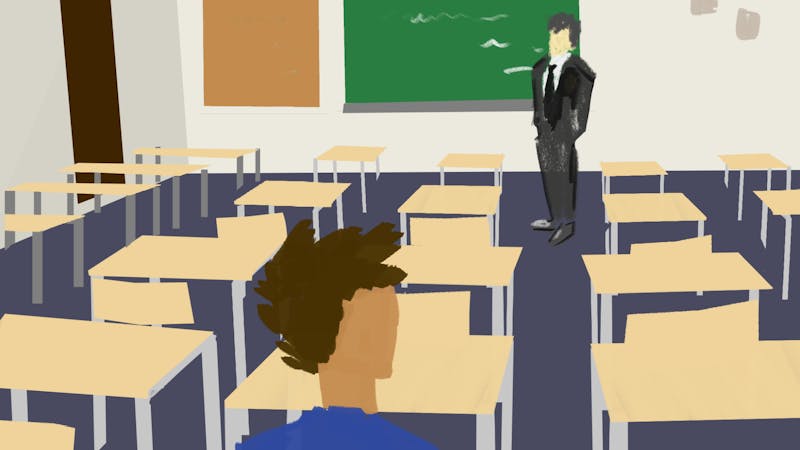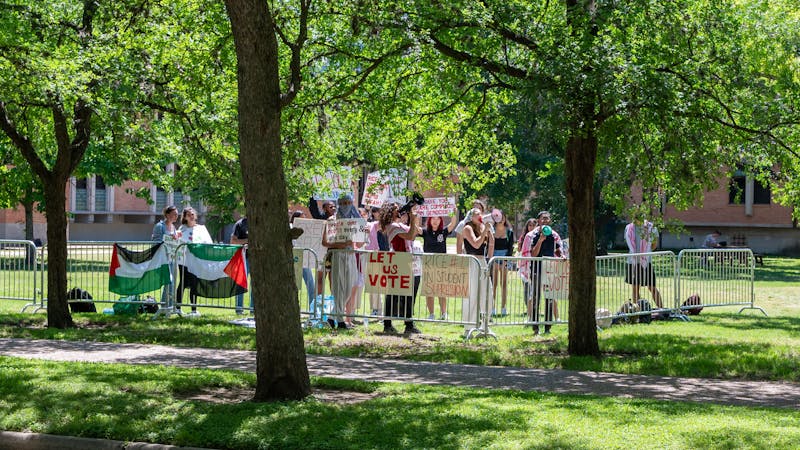Rice hosts Q&A with Condoleezza Rice
More than 1,000 Rice students, faculty, and Houston community members filled Tudor Fieldhouse on Tuesday evening to listen to Condoleezza Rice speak about her years in the national government.
Hanszen College President Coco Owens said she was intrigued by the lecture but believed Rice undergraduates should have been prioritized attendees.
"PBS sold tickets, money was made and benefactors were happy, but the politically apathetic student body remained just that as a result of the poor organization of marketing and ticket distribution across campus," Owens, a senior said. "We have paid a lot of money to learn at Rice, so why should University of Houston students fill our stadium seats to gain access to a fascinating woman I would have much rather preferred young Rice students having access to?"
Baker College sophomore Jenny An, also an audience member, said she loved Rice's honesty and passion but wished there had been more time for students to interact with her. She added that the general lack of student excitement about the event surprised her.
"I asked so many of my friends if they were going to the event, and they said no, which I didn't understand" An noted. "To me, this was an once-in-a-lifetime opportunity."
Houston PBS anchor Ernie Manouse facilitated the conversation with Rice in a question-and-answer format and started by asking her about her favorite political period. She responded that, other than the founding of the country, she would have wanted to serve as Secretary of State during the late 1940s, when George Marshall and Dean Acheson were engaging the U.S. with the rest of the world through their policies.
"The really good [global] decisions the U.S. made that eventually led to our victory in the Cold War were actually taken from 1946 to 1948," Rice said.
Manouse then brought the conversation back to Rice's past, asking her about how her family and education had affected her world view. Rice said she had grown up in a family of educators, and her parents had never denied her any educational opportunities.
"My parents taught me that I can't control my circumstances, but I can control my responses to them," Rice said. "So I grew up in segregated Birmingham, Alabama with a sense of limitless horizons."
She said she applied this optimism to government service to handle trials and tribulations.
"With a positive mindset, what seems impossible at the time seems inevitable in retrospect," Rice noted.
Parents can instill this sense of optimism and boundlessness in their children by setting high expectations from the beginning, Rice said.
"Children will live up to high expectations or down to low expectations," Rice explained. "Then, they will learn to have high expectations for themselves."
Rice said the nation's education system is a critical component of helping children excel and said the greatest national security threat is the crisis in K-12 education. Americans are not united by blood, ethnicity or religion; they are united by a focus on the future, not the past, Rice said. Without great teachers, high expectations and quality education, such unity is impossible, she said.
"For example, if kids are going to do performances, don't coddle them," Rice said. "Encourage them to practice – it will be better for both them and the audience."
Manouse also addressed Rice's years as a public servant, asking her when she first decided to become involved in politics. Rice said she really had no interest in politics; her true passion was foreign policy. She said she became a Soviet specialist after dropping an initial ambition to become a pianist and eventually signed on with then Governor of Florida George H.W. Bush to build his foreign policy agenda.
"I love policy, but public service is a marriage of politics and policy," Rice said. "You can do policy outside the political system, but that'll have very little impact."
Rice and Manouse also discussed political integrity. Rice said that although she aligned with the Republican Party politically because of her foreign policy views and preference for the private sector and a small government, her true allegiance lay with finding good leadership for America.
"I want people who are going to lead us, tell the truth, and play to our greatest sense of optimism, not encourage our worst fears or coddle us," Rice said.
Rice mentioned that maintaining one's values was critical in public service, and if something were to cross her integrity, she would have an obligation to resign. She said she never encountered such a situation, though, as Secretary of State, she did disagree with then-President George W. Bush at times.
In those instances, Rice said she felt comfortable expressing her dissent to Bush because they had built a relationship of tremendous trust while working on Bush's campaign together.
"Early experiences are where you build trust," Rice noted. "By the time you go to the Oval Office, it is extremely important to have people by your side who respect your office but are not intimidated by it and will tell you the truth."
Rice also described her experiences as a female African-American Secretary of State, saying that gender and race often entered her thoughts, particularly the insufficient number of minority representatives in the national government. However, she added that she did not let gender and race hinder her and even used it to her favor in multiple situations.
"When you are young and in an all-male field, it can be tough, but when you are the Secretary of State and let someone treat you badly because you are a woman, it's your fault because you have the arsenal to deal with that," Rice said.
Rice concluded the dialogue by talking about the importance of looking forward rather than reflecting on past events because history's judgment of them will usually differ from current perceptions.
"If I had told you in the late 1940s that the Soviet Union would fall, you would've had me committed," Rice said. "When at the beginning of an epoch, don't try to judge what might look good 30 or 40 years down the road. Be prepared to let history judge."
Rice then fielded questions on a variety of topics – from the Soviet Union and state-sponsored terror to student leadership and career choice, and shared anecdotes about dealing with unorthodox leaders like Moammar Gadhafi, making a cameo on "30 Rock," and having an oil tanker named after her. She ended by commenting on the nature of public service.
"People who serve the public are involved in something bigger than themselves," Rice said. "Public service is good for the soul."
The event was jointly hosted by HoustonPBS/KUHT-TV and the Baker Institute as part of their Elevate Lecture Series and Shell Distinguished Lecture Series, respectively.
More from The Rice Thresher

Jones wins men’s and women’s Beer Bike races, GSA snags alumni
Jones College won both the women’s and men’s Beer Bike 2024 races, while the Graduate Student Association claimed the alumni team win. Hanszen College bike teams were the runner-up in the alumni and men’s races, while Brown College was the runner-up in the women’s race. Martel and McMurtry Colleges did not bike in the alumni race, according to the Rice Program Council’s final report, and the GSA was disqualified from the men’s race for accidentally sending out two bikers simultaneously.

Rice wraps up Conversations on the Middle East series, looks to fall semester
With the final session rescheduled to Wednesday April 17, the Conversations on the Middle East series is coming to a close.

Rice SJP hosts protest in response to S.RES 02 tabling
Rice Students for Justice in Palestine staged a walkout and protest in response to the tabling of S.RES 02, a resolution that proposed a divestment of student funds to Israel-aligned companies, outside the Allen Center, April 12. The protest occurred during Owl Days, when prospective students were touring the campus.

Please note All comments are eligible for publication by The Rice Thresher.